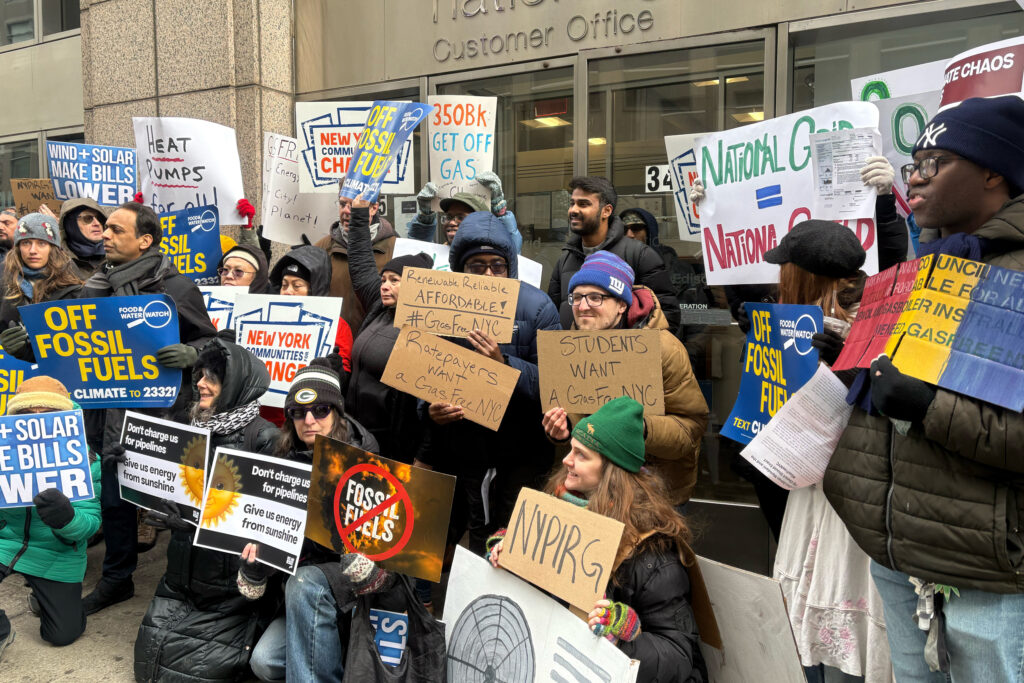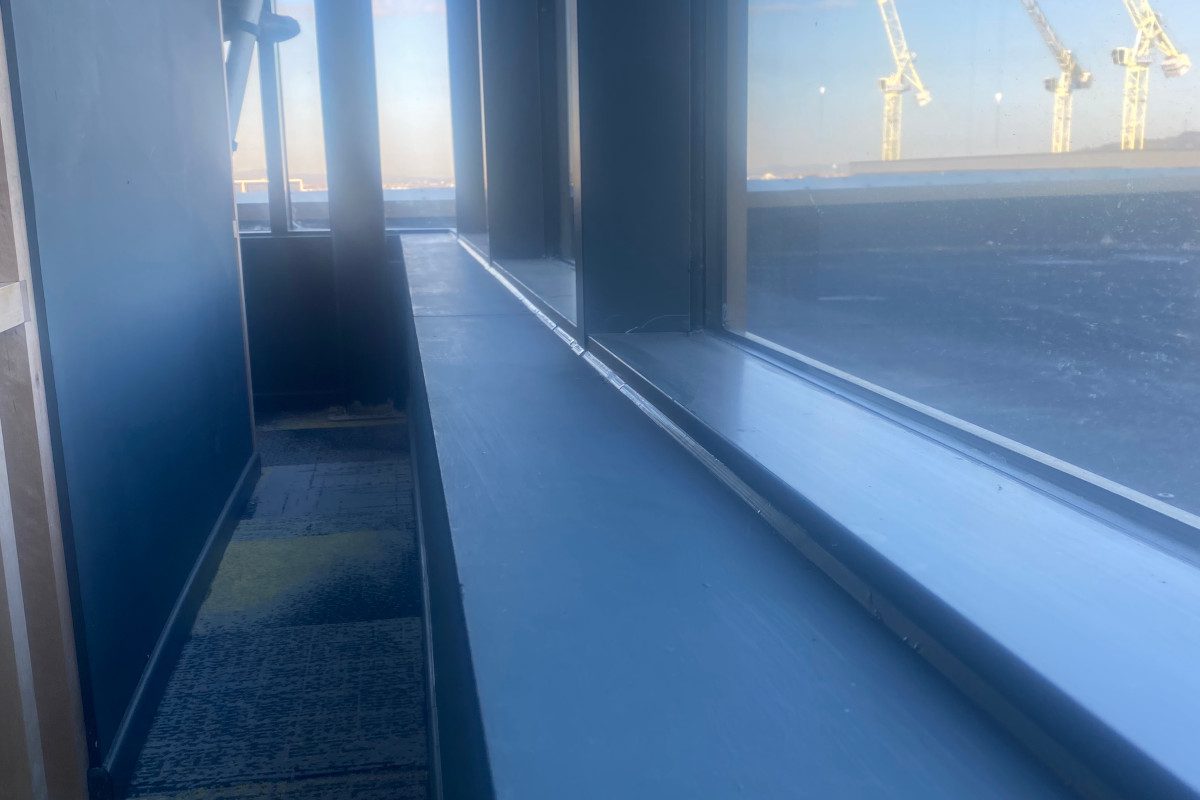A small Native American reservation in northern Wisconsin is home to the “Everglades of the North,” a vast wetlands on the shores of Lake Superior, one of the largest freshwater lakes in the world. The tribe that lives there, the Bad River Band of the Lake Superior Tribe of Chippewa Indians, has fought to protect its homeland, and the wild rice beds that are a cornerstone of tribal culture and their food supply, since before the reservation was established in 1854.
“Bad River” focuses on the latest chapter in that fight, a legal battle to get an aging crude oil pipeline removed from their reservation. The film, which was awarded Best Documentary at the Environmental Media Association Awards in Los Angeles on Oct. 26, premieres on Peacock on Nov. 1.
Easements on a dozen parcels of land for the 71-year-old Enbridge pipeline expired in 2013. The Canadian pipeline company has been trespassing on tribal land for more than a decade and erosion along the pipeline’s route poses a “real and unreasonable risk” that could cause the pipe to rupture, according to a 2023 federal court ruling.
Explore the latest news about what’s at stake for the climate during this election season.
Enbridge has dismissed concerns of a potential spill, saying safety “is the very foundation of our business.” The company, which continues to operate the pipeline, is seeking state and federal approval to reroute the line around the reservation.
Inside Climate News reporter Victoria St. Martin spoke with Mary Mazzio, the film’s producer, writer and director, in the lead up to November—Native American Heritage Month—to hear more about the film, the tribe and what she feels the Bad River Band can teach others about environmental protection. This interview has been edited for length and clarity.
VICTORIA ST. MARTIN: How did this come about? What was the idea for “Bad River”?
MARY MAZZIO: I had an opportunity to meet Mike Wiggins, the former chairman of the Bad River Band. We began talking about the David and Goliath kind of battle that the tribe, which is located in northern Wisconsin, was waging against a Canadian pipeline operator.
The fight was over a 71 year-old pipeline that cut through the heart of the reservation. The pipeline is now at imminent risk of rupture, according to the judge in the litigation, and the pipeline operator continues to pump oil, even though the terms of its easement, or its lease, had expired 10 years earlier.
Wiggins and I were communicating by Zoom during Covid, and he said to me, “Why don’t you come visit and we’ll do some canoe diplomacy.” I thought, OK, I’m an athlete. I was a rower. I don’t know what canoe diplomacy is, but I’m 100 percent up for it.
So that’s how this journey started. And I learned way more than I ever could have imagined embarking on this journey with my co-producer, Grant Hill, a part-owner of the Atlanta Hawks, and my other co-producer, Allison Abner, who is a descendant of the Stockbridge Munsee Band. The three of us, honestly, were just stunned at so many levels by the fortitude and resilience of the Bad River Band.
ST. MARTIN: This is at its heart an environmental story, but you were inspired by something else, right?
MAZZIO: I thought this would be a pipeline movie, and it turned into an amazing historical retrospective of fighting for sovereignty, of the Bad River people fighting for their land and for clean water. This is just a new chapter in that battle.
The Bad River Band, originally called the Lake Superior Ojibwe, have been fighting tooth and nail for their environment for so many different profound reasons, really for hundreds of years. What I thought was going to be sort of an amazing chapter turned into a longer story of resilience. And you know, at the end of the day, you mentioned, it’s an environmental story. It’s just extraordinary that you have this small group of people that are standing up for all of America in terms of protecting Lake Superior.
We were at an event a few weeks ago, and the former chairman, Mike Wiggins, said, “Look, this is our patriotic and civic duty to protect this resource that all Americans will be drawing on in the coming years with increasing extreme weather.” What a profound statement that this small group of people are shouldering the burden for all of us.


ST. MARTIN: How would you describe resilience, and how does one stay resilient or use the skills that the Bad River Band has to stand up to injustices?
MAZZIO: The Bad River people have a value system that is very different from the classic, pull-yourself-up-by-the-bootstraps, rugged, individual American mentality. The whole perspective of the Bad River Band is around long-term thinking. And when you are thinking of your seventh generation, both past and present, you start to make decisions that are very much communal in nature. Whether you call it a skill or a value, certainly, they have applied this value system. To see a community that can come together for long-term benefits, not just for themselves, but for all of us, is just an extraordinary spirit of generosity.
ST. MARTIN: So what has happened in regards to the pipeline?
MAZZIO: The Bad River Band had to file in federal district court to eject the Canadian pipeline operator for not just an imminent threat of rupture, but because the operator’s rights to pump oil along three miles of its pipeline corridor expired in 2013. What was fascinating and unusual was that the Band, with very little resource at its disposal, filed suit.
They managed to get through a trial, and the federal district court almost shockingly found in their favor. [The judge] required the pipeline operator to vacate by 2026. His reasoning was, “I’m going to give you a couple of years so that the markets won’t be tremendously unsettled.”
This story is funded by readers like you.
Our nonprofit newsroom provides award-winning climate coverage free of charge and advertising. We rely on donations from readers like you to keep going. Please donate now to support our work.
Donate Now
Now this is a thoroughfare to move oil from western Canada to eastern Canada. It happens to dip down to the United States for really interesting reasons when it was installed back in the 1950s, but that’s the state of the [situation]. The pipeline operator immediately appealed. The case is now before the Seventh Circuit Court of Appeals in Chicago, and a decision is expected any day.
Meanwhile, the Bad River Band is fighting a secondary battle, and that is that the pipeline company has now offered to reroute the pipeline. The problem is the reroute would put this leg of the pipeline in a worse location, not on the reservation, but smack dab in the Bad River watershed, which would [entail] 139 blasting locations over water, including over a pristine glacial aquifer. And so there has been this rush to reroute, a reroute that just hugs the reservation.
So the Bad River Band has been not only fighting this legal fight, but is now facing a pipeline that will go through what they believe to be even worse terrain, presenting them with a very difficult choice. And again, going back to sort of that idea of long-term values in the film, the band had been offered $30 million to settle this case, which for a small, really disenfranchised community, in many ways, from an economic standpoint, is a lot of money to turn down. The last public offer was $80 million to settle this case, and the new chairman of the band, Robert Blanchard, said, “Look, we’re fighting this fight for our seventh generation. We need to continue to stay true to who we are and what our responsibility is, not just to our seventh generation, but like Mike Wiggins said, to all Americans.”
ST. MARTIN: Is there a message that you would like to give to people who might be in the same kind of situation, who might be feeling like, “I want to use my voice. I saw this movie. I’m inspired”?
MAZZIO: I think the takeaway here is that you have this small group that is fighting to protect one of the world’s most precious resources, Lake Superior, and they are doing it by themselves, but they’re doing it for all of us. I feel that if this project can prompt people to think about each other and do more for each other, wouldn’t that be a beautiful thing?


ST. MARTIN: As a climate and health reporter, I’m curious: What are the health implications of this pipeline?
MAZZIO: The Bad River Band is acutely concerned about extractive industries, and any kind of health implications, which also includes harm to Native women. When there is new construction on pipelines, there is an uptick in violence against Native women. And from a sort of internal health standpoint, in addition to an increase in trafficking and sexual assault of Native women during construction, you do have additional concerns like, “What if this is leaking? What are we drinking? Why are people getting cancer here?”
And with this particular group of people you have diabetes. Many elders spoke to the urgency of protecting this environment because you’ve got wild rice, you’ve got walleye, you’ve got a whole foods diet that is extraordinarily rich and healthful. And many of these people rely on this ecosystem for that kind of healthful diet. It’s something that money can’t buy, because they simply don’t have a Whole Foods right there.
From a health standpoint, the Bad River Band, like many Native communities, [is] battling the long-term effects of both climate change, industrialization and all that went with it from a health perspective. But you know, if this thing ruptures, all of a sudden you’ve got fresh drinking water at risk. That’s a real problem.
ST. MARTIN: Is there anything that you want people to take away from the film?
Yes, particularly as it relates to natural resources. More of us can and should be fighting and thinking long term about how we can be better stewards and vanguards and guardians of the resources that are increasingly precious.
And it doesn’t matter how you feel about climate change. We have allowed so many precious resources to become incredibly toxic. And we are paying the price with extreme weather and extreme weather patterns. How do we think about a more collective approach to safeguarding our own natural resources and being allies with people who are on the front lines, like the Bad River Band? There are many Native communities across America that are fighting these fights, and many cannot sustain the financial burden of going the distance.
About This Story
Perhaps you noticed: This story, like all the news we publish, is free to read. That’s because Inside Climate News is a 501c3 nonprofit organization. We do not charge a subscription fee, lock our news behind a paywall, or clutter our website with ads. We make our news on climate and the environment freely available to you and anyone who wants it.
That’s not all. We also share our news for free with scores of other media organizations around the country. Many of them can’t afford to do environmental journalism of their own. We’ve built bureaus from coast to coast to report local stories, collaborate with local newsrooms and co-publish articles so that this vital work is shared as widely as possible.
Two of us launched ICN in 2007. Six years later we earned a Pulitzer Prize for National Reporting, and now we run the oldest and largest dedicated climate newsroom in the nation. We tell the story in all its complexity. We hold polluters accountable. We expose environmental injustice. We debunk misinformation. We scrutinize solutions and inspire action.
Donations from readers like you fund every aspect of what we do. If you don’t already, will you support our ongoing work, our reporting on the biggest crisis facing our planet, and help us reach even more readers in more places?
Please take a moment to make a tax-deductible donation. Every one of them makes a difference.
Thank you,



















